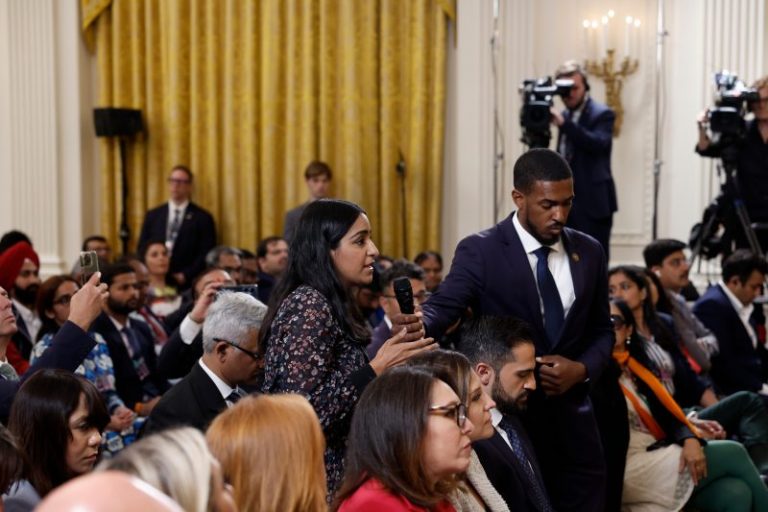The White House is defending a Wall Street Journal reporter who has faced online harassment since asking Indian Prime Minister Narendra Modi a question about human rights during his state visit last week.
Reporter Sabrina Siddiqui has come under a barrage of attacks on social media since she asked Modi on Thursday what steps his government would take to uphold free speech and to improve the rights of Muslims and other minorities in India. The harassment has included threats, slurs and baseless accusations that Siddiqui asked the question out of political bias. The critics and attackers have ranged from anonymous trolls to at least one Indian government official with ties to Modi’s Hindu nationalist party.
On Monday, White House officials decried the harassment of the reporter.
“We absolutely condemn any harassment of journalists anywhere under any circumstances,” National Security Council spokesman John Kirby told reporters. “That’s completely unacceptable. And it’s antithetical to the very principles of democracy that were on display last week during the state visit.”
White House press secretary Karine Jean-Pierre echoed Kirby’s sentiments, saying that the White House held the news conference because it was committed to freedom of the press.
“We certainly condemn any efforts of intimidation or harassment of a journalist or any journalist that is just trying to do their job,” she said.
Modi, who represents the right-wing Hindu nationalist party in India, has served as India’s prime minister since 2014, winning reelection in 2019. India does not have term limits for its prime ministers, and Modi is gearing up to run for reelection to a third term next year.
Under his tenure, Modi has been criticized for eroding India’s democracy, suppressing criticism of his Bharatiya Janata Party and trying to impose Hindu nationalism across the country. A report by Human Rights Watch last year warned that Indian states ruled by his right-wing party have had increased incidents of discrimination and abuse against Muslims, including the illegal bulldozing of Muslim homes and businesses.
Against this backdrop, human rights groups had expressed concern over Modi’s state visit, particularly given that Biden has been outspoken about the importance of democracy prevailing over autocracy.
Siddiqui was one of only two reporters called on at the news conference with Biden and Modi — one that was shorter than Biden’s previous news conferences with state leaders.
Siddiqui first asked Biden about his comments at a recent fundraiser where he had called Chinese President Xi Jinping a dictator, and about what his message was to those who argued his administration was overlooking the targeting of religious minorities and crackdown on dissent in India under Modi.
She then asked a similar question of Modi.
“India has long prided itself as the world’s largest democracy, but there are many human rights groups who say that your government has discriminated against religious minorities and sought to silence its critics,” Siddiqui said to the prime minister. “As you stand here in the East Room of the White House, where so many world leaders have made commitments to protecting democracy, what steps are you and your government willing to take to improve the rights of Muslims and other minorities in your country and to uphold free speech?”
Modi expressed surprise at the question, emphasizing repeatedly in a lengthy response that democracy was in India’s “DNA.”
“Democracy is our spirit. Democracy runs in our veins,” Modi said. “We have always proved that democracy can deliver, and when I say deliver, this is regardless of caste, creed, religion, gender. There is absolutely no space for discrimination.”
According to a review of posts on Twitter, the harassment of Siddiqui began shortly after clips of the news conference surfaced. Many hailed Modi’s answer as satisfactory, while hurling insults — or worse — at Siddiqui. The longtime political reporter has since changed her Twitter account settings to private, and she directed questions to the Wall Street Journal on Wednesday.
“Sabrina Siddiqui is a respected journalist known for her integrity and unbiased reporting,” the Wall Street Journal said in a statement. “This harassment of our reporter is unacceptable, and we strongly condemn it.”
The harassment also prompted a slew of statements of support from several professional organizations, including the White House Correspondents’ Association, the Dow Jones news guild, the Committee to Project Journalists and the South Asian Journalists Association (SAJA).
SAJA president Mythili Sampathkumar noted on Twitter that Siddiqui had asked a fair question that anyone on Modi’s team should have expected.
“His response and how Indian journalists haven’t had the [opportunity] to ask him this in 9 years is what we should talk about more,” Sampathkumar wrote.
Tamara Keith, president of the White House Correspondents’ Association, called the harassment unacceptable and said the organization stood by Siddiqui and the questions she chose to ask.
“In a democracy, journalists shouldn’t be targeted simply for doing their jobs and asking questions that need to be asked,” Keith said in a statement Tuesday.

